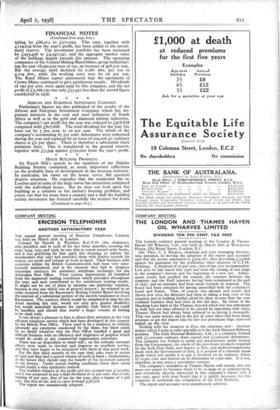COMPANY MEETING
THE LONDON AND THAMES HAVEN OIL WHARVES LIMITED
DIVIDEND TEN PER CENT. TAX FREE
THE fortieth ordinary general meeting of the London & Thames Haven Oil Wharves, Ltd., was held on March 28th at Winchester House, Old Broad Street, London, E.C. Mr. Thos. C. J. Burgess, chairman and joint managing director, who presided, in moving the adoption of the report and accounts said that the profits amounted to £203,767, after providing £59,806 against the guarantee for the preference share interests of C.I.M. Holdings. A dividend of so per cent., free of tax, was recommended. Last year he had stated that 1936 had been the closing of one stage in the company's history and the beginning of a new one. Subse- quent events had justified the remark, the contract between the company and the Shell interests having been terminated at the end of 1937, and no attempts had been made towards its renewal. The board had been criticised for having quarrelled with the company's bread and butter. That, of course, was absurd, and events had shown how wise the directors had been in taking a long view of the situation and in looking further afield for their income than the very confined business they had done in the old days. By virtue of the Mucking Line limit in the Thames, beyond which low test petroleum in bulk had not been allowed to be carried by importing tank ships, Thames Haven had always been referred to as having a monopoly. That was quite untrue, and in the last 3o years there had been many attempts to get the import line for low test petroleum ships removed higher up the river. Dealing with the situation in Eire, the chairman said : Another matter which I want to refer specially to is the Irish National Refinery position. The Irish National Refineries, Ltd., is a company formed with £1,030,000 ordinary share capital and £1,000,000 debentures. The company was formed to refine and manufacture, under licence from the Government, the whole of the petroleum products required by the Irish Free State, now known as Eire, and under arrangements made with the Government of Eire, it is assured of a constant equal profit which will enable it to pay a dividend on its ordinary shares of to per cent. and interest on its debentures of 5 per cent. It is not, therefore, in any sense a speculative venture.
The company's usefulness at Thames Haven will remain, but one must not expect its business there to be so large or so remunerative, and everybody directly interested in this company's future will, I am sure, agree with your board that it is rightly necessary for this company to undertake the completion of the Irish Refinery.
The report and accounts were unanimously adopted.














































 Previous page
Previous page